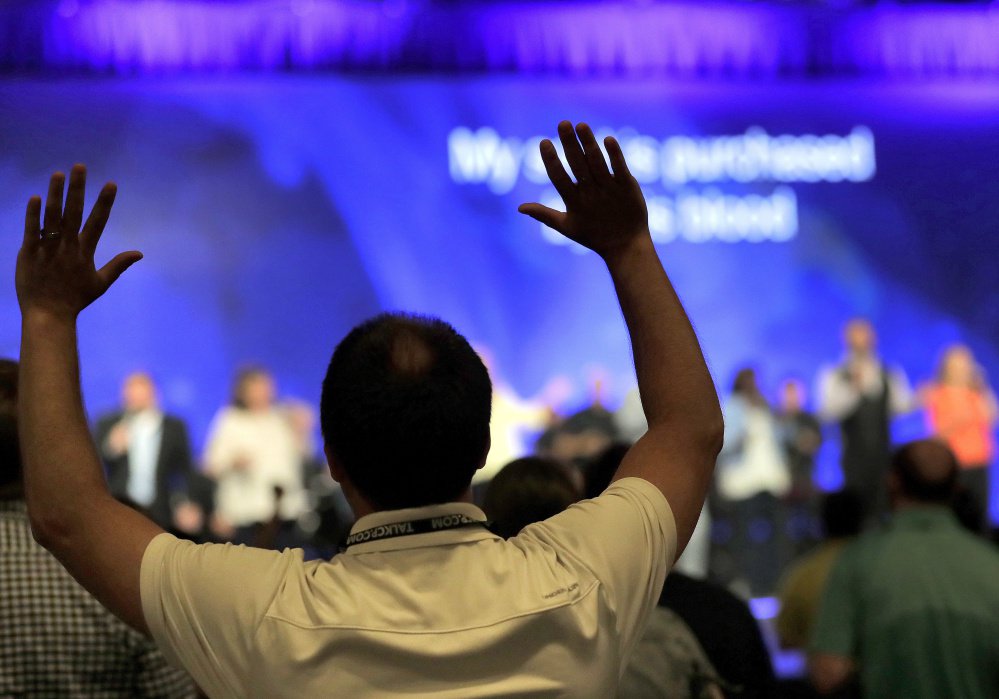A new survey shows a dramatic shift in attitudes toward favoring gay marriage among a younger generation of white evangelicals, a group considered to be one of the most conservative on the issue.
Just a decade ago, the gap between younger evangelicals and older evangelicals on the issue was not wide, according to the Pew Research Center. But a new survey suggests that the generational divide has grown much wider, with about half of evangelicals born after 1964 now favoring gay marriage.
According to Pew, 47 percent of Generation X/millennial evangelicals (those born after 1964) favor gay marriage, compared with 26 percent of boomer and older evangelicals (those born between 1928 and 1964).
“I think a shift is inevitable. It’s just a matter of how long,” said Julie Rodgers, a lesbian who once worked for evangelical Wheaton College in Illinois.
Rodgers was once part of an ex-gay ministry and ran in Southern Baptist circles. She was seen by some as a poster child for celibacy while she was a staff member in Wheaton College’s chaplain’s office. The college received backlash for hiring her and she became gay marriage affirming while she was there, so she resigned from her position in 2015. She said she looked to people like Christian ethicist David Gushee, who changed his views and began to affirm same-sex relationships in 2014. Rodgers said her views began to shift when she saw another way of interpreting the Bible.
“When pastors and leaders begin to come out (as LGBT affirming), people are going to move. They just need permission,” she said. “It gives people another perspective and permission to say, ‘I feel that way, too.’”
Earlier this month, Rodgers got engaged to Amanda Hite, an entrepreneur based in D.C., whom she met after she left.
LANDMARK’S AFTERMATH
Two years after the Supreme Court legalized gay marriage nationwide, support for it is at its highest overall, with 62 percent favoring gay marriage and 32 percent opposing it. In 2010, according to Pew, a little less than half of Americans supported it.
When young people see an issue legalized, they begin to believe it must be right, said Glenn Stanton, director of Family Formation Studies at Focus on the Family.
“We see that with pot in Colorado,” he said. “There’s a legitimizing and institutionalizing when you make something legal.”
But Stanton believes the attitude shifts don’t really reflect a change in young evangelicals’ conviction on the issue, which he said was “paper thin.”
“A quality of youth is being idealistic and wanting to believe the world can be a certain way,” Stanton said. “Why can’t we all get married?”
Support for same-sex marriage has risen across all religious groups in recent years. As a whole, white evangelicals still stand out in opposition to gay marriage; 35 percent of white evangelicals favor gay marriage, compared with about 60 percent who are opposed.
Most megachurches do not marry gays and lesbians, but some people think that attitudes might be shifting in some churches. Most evangelicals believe gays are welcome as members and leaders in their churches – as long as they remain celibate.
In May, a megachurch in Orlando called Northland, A Church Distributed, hosted a public forum by the Reformation Project, an organization that wants to change churches’ attitudes on LGBT issues.
Northland’s pastor, Joel Hunter, told the Orlando Sentinel that his church has no plans to change its position that the Bible prohibits gay relationships, but his church hosted the forum as a response to the Pulse shooting last year to build bridges with the LGBT community. Hunter said via text message that his elders have asked him to decline more press inquiries.
ATTITUDES SLOWLY SHIFTING
Matthew Vines, who dropped out of Harvard University to start the Reformation Project, said Northland was the biggest church yet willing to host a conversation with his group. Vines believes there’s a slow, steady trajectory toward evangelicals affirming gay marriage.
When popular author Jen Hatmaker said last fall she affirms same-sex relationships, her books were pulled from Lifeway Christian Resources stores. But Vines thinks that Hatmaker and others who have become LGBT affirming still retain their influence. “I don’t think they were as successfully farewelled as they would have been three to five years ago,” he said.
Attitude shifts won’t happen overnight, Vines said. “It’s important that young evangelicals have changed their mind, but it’s not enough to create institutional change,” he said.
The question for many evangelicals has been whether LGBT issues are matters where they can agree to disagree and still work together, perhaps like the question of when children should be baptized or whether women can be ordained.
When the issue came up for World Vision, one of the largest Christian nonprofits in the country, in 2012, the answer was a sharp no – it lost thousands of donors right away. And InterVarsity Christian Fellowship, a major ministry, announced last fall that its employees must affirm its views that marriage is between a man and a woman.
Some evangelicals believe there’s a difference between supporting gay marriage as a public policy matter and gay marriage as sanctioned by churches. A large majority of white evangelicals (including younger generations) continue to see homosexual relations as morally wrong, according to the General Social Survey.
The 2016 survey found 75 percent of white evangelicals saying homosexual sexual relations are always or nearly always wrong. That number is down from 82 percent in 1996 and 90 percent in 1987. The survey does not show a large generational gap, however. In 2014-2016 surveys, 70 percent of Generation X/millennial white evangelicals said same-sex sexual relations are nearly always or always wrong, compared to 81 percent of baby boomers/older generations.
Send questions/comments to the editors.


